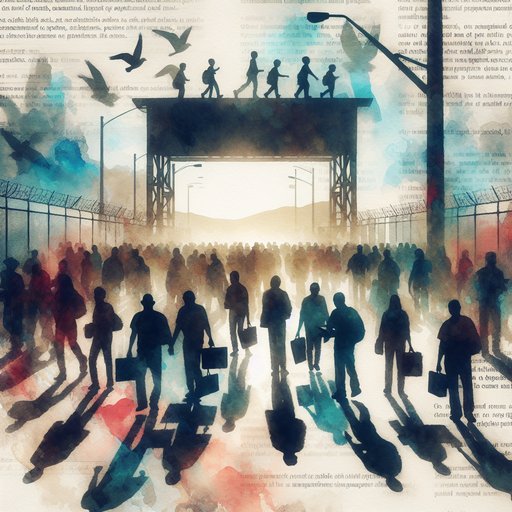
In a week marked by significant shifts in migration policies, governments in the US and Europe are grappling with the complexities and ramifications of new agreements and enforcement strategies. The United States, under the Trump administration, has seen an increased crackdown on immigration, affecting everything from corporate hiring practices to religious practices in local communities. Meanwhile, the UK and France are embroiled in negotiations over a controversial asylum deal as tensions rise in response to surging migrant entries.
The Trump administration's rigid immigration stance continues to sow international and domestic discord. Recently, immigration policies have been tightened, increasing the frequency of deportations and detentions. This escalation has had a profound impact on both individuals and industries, with substantial anxieties arising among investors concerned about market stability and the financial sector's ability to engage in cross-border activities effectively [1][2]. Additionally, faith-based communities have been forced to make notable adjustments; for the first time, the Diocese of San Bernardino has granted Catholics a dispensation from attending Mass due to the fear of ICE detentions [3].
In Europe, tensions surrounding migration policies are no less pronounced. During a state visit, the UK's Prime Minister and France's President discussed a “one in, one out” migrant agreement. This policy would see migrants attempting to enter the UK by boat returned to France, while facilitating entry for recognized asylum seekers [4][5]. Although this arrangement aims to balance responsibilities, France has not agreed to the proposal, leading to a stalemate in negotiations and increasing uncertainty over future immigration cooperation between the two nations [5].
Simultaneously, Greece has announced a temporary halt on processing asylum claims from North African migrants due to a surge in arrivals [6]. This suspension highlights the broader European struggle to manage and process an increasing number of asylum applications without overburdening existing systems. The decision has drawn concern from humanitarian organizations warning of deteriorating conditions for thousands seeking refuge. These policy maneuvers are emblematic of broader transformations in global migration governance driven by rising migration pressures, political objectives, and public sentiment.
While certain policies intend to streamline processes and increase accountability, the international community is wary of the potential human repercussions, prompting debates on balancing security concerns with humanitarian needs. As these policies unfold, affected individuals and sectors brace for the tangible impacts of these decisions on everyday life.
Sources
- Wall Street is getting worried about Trump's immigration policies (Business Insider, 2025-07-09)
- How Trump's immigration crackdown is reshaping financial industry hiring, travel, and dealmaking (Business Insider, 2025-07-09)
- Diocese of San Bernardino issues dispensation saying Catholics who fear ICE don't have to attend Mass (NPR, 2025-07-09)
- Starmer says 'one in, one out' migrant deal with France to begin within weeks (BBC News, 2025-07-10)
- UK’s Starmer hosts France’s Macron for migration talks during state visit (Al Jazeera English, 2025-07-09)
- Greece to halt migrant asylum processing from North Africa (Al Jazeera English, 2025-07-09)
























